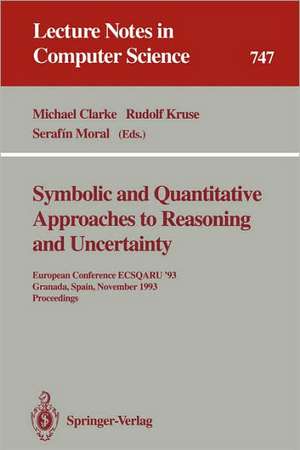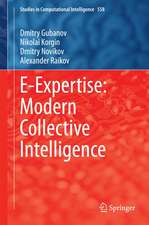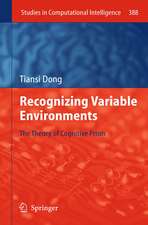Symbolic and Quantitative Approaches to Reasoning and Uncertainty: European Conference ECSQARU '93, Granada, Spain, November 8-10, 1993. Proceedings: Lecture Notes in Computer Science, cartea 747
Editat de Michael Clarke, Rudolf Kruse, Serafin Moralen Limba Engleză Paperback – 20 oct 1993
Din seria Lecture Notes in Computer Science
- 20%
 Preț: 1061.55 lei
Preț: 1061.55 lei - 20%
 Preț: 307.71 lei
Preț: 307.71 lei - 20%
 Preț: 438.69 lei
Preț: 438.69 lei - 20%
 Preț: 645.28 lei
Preț: 645.28 lei -
 Preț: 410.88 lei
Preț: 410.88 lei - 15%
 Preț: 580.46 lei
Preț: 580.46 lei - 17%
 Preț: 427.22 lei
Preț: 427.22 lei - 20%
 Preț: 596.46 lei
Preț: 596.46 lei -
 Preț: 381.21 lei
Preț: 381.21 lei - 20%
 Preț: 353.50 lei
Preț: 353.50 lei - 20%
 Preț: 1414.79 lei
Preț: 1414.79 lei - 20%
 Preț: 309.90 lei
Preț: 309.90 lei - 20%
 Preț: 583.40 lei
Preț: 583.40 lei - 20%
 Preț: 1075.26 lei
Preț: 1075.26 lei - 20%
 Preț: 310.26 lei
Preț: 310.26 lei - 20%
 Preț: 655.02 lei
Preț: 655.02 lei - 20%
 Preț: 580.93 lei
Preț: 580.93 lei - 20%
 Preț: 340.32 lei
Preț: 340.32 lei - 15%
 Preț: 438.59 lei
Preț: 438.59 lei - 20%
 Preț: 591.51 lei
Preț: 591.51 lei - 20%
 Preț: 649.49 lei
Preț: 649.49 lei - 20%
 Preț: 337.00 lei
Preț: 337.00 lei -
 Preț: 449.57 lei
Preț: 449.57 lei - 20%
 Preț: 607.39 lei
Preț: 607.39 lei - 20%
 Preț: 1024.44 lei
Preț: 1024.44 lei - 20%
 Preț: 579.30 lei
Preț: 579.30 lei - 20%
 Preț: 763.23 lei
Preț: 763.23 lei - 20%
 Preț: 453.32 lei
Preț: 453.32 lei - 20%
 Preț: 575.48 lei
Preț: 575.48 lei - 20%
 Preț: 585.88 lei
Preț: 585.88 lei - 20%
 Preț: 825.93 lei
Preț: 825.93 lei - 20%
 Preț: 763.23 lei
Preț: 763.23 lei - 17%
 Preț: 360.19 lei
Preț: 360.19 lei - 20%
 Preț: 1183.14 lei
Preț: 1183.14 lei - 20%
 Preț: 340.32 lei
Preț: 340.32 lei - 20%
 Preț: 504.57 lei
Preț: 504.57 lei - 20%
 Preț: 369.12 lei
Preț: 369.12 lei - 20%
 Preț: 583.40 lei
Preț: 583.40 lei - 20%
 Preț: 343.62 lei
Preț: 343.62 lei - 20%
 Preț: 350.21 lei
Preț: 350.21 lei - 20%
 Preț: 764.89 lei
Preț: 764.89 lei - 20%
 Preț: 583.40 lei
Preț: 583.40 lei -
 Preț: 389.48 lei
Preț: 389.48 lei - 20%
 Preț: 341.95 lei
Preț: 341.95 lei - 20%
 Preț: 238.01 lei
Preț: 238.01 lei - 20%
 Preț: 538.29 lei
Preț: 538.29 lei
Preț: 338.16 lei
Preț vechi: 422.70 lei
-20% Nou
Puncte Express: 507
Preț estimativ în valută:
64.71€ • 67.73$ • 53.86£
64.71€ • 67.73$ • 53.86£
Carte tipărită la comandă
Livrare economică 31 martie-14 aprilie
Preluare comenzi: 021 569.72.76
Specificații
ISBN-13: 9783540573951
ISBN-10: 354057395X
Pagini: 408
Ilustrații: XII, 396 p.
Dimensiuni: 155 x 233 x 21 mm
Greutate: 0.58 kg
Ediția:1993
Editura: Springer Berlin, Heidelberg
Colecția Springer
Seria Lecture Notes in Computer Science
Locul publicării:Berlin, Heidelberg, Germany
ISBN-10: 354057395X
Pagini: 408
Ilustrații: XII, 396 p.
Dimensiuni: 155 x 233 x 21 mm
Greutate: 0.58 kg
Ediția:1993
Editura: Springer Berlin, Heidelberg
Colecția Springer
Seria Lecture Notes in Computer Science
Locul publicării:Berlin, Heidelberg, Germany
Public țintă
ResearchCuprins
$$\mathcal{R}\mathcal{E}\mathcal{S}$$ : A formalism for reasoning with relative-strength defaults.- A semantics for open normal defaults via a modified preferential approach.- Possibilistic logic: From nonmonotonicity to logic programming.- Learning membership functions.- The use of possibilistic logic PL1 in a customizable tool for the generation of production-rule based systems.- Probabilistic network construction using the minimum description length principle.- IDAGs: A perfect map for any distribution.- Learning non probabilistic belief networks.- A practical system for defeasible reasoning and belief revision.- Influence of granularity level in fuzzy functional dependencies.- A logic for reasoning about safety in decision support systems.- Acceptability of arguments as ‘logical uncertainty’.- A temporal model theory for default logic.- Uncertainty in constraint satisfaction problems: A probabilistic approach.- Interference logic = conditional logic + frame axiom.- A unifying logical framework for reason maintenance.- Taxonomic linear theories.- Making inconsistency respectable: Part 2 — Meta-level handling of inconsistency.- Restricted access logics for inconsistent information.- Translating inaccessible worlds logic into bimodal logic.- A new approach to semantic aspects of possibilistic reasoning.- Probabilistic consistency of knowledge bases in inference systems.- Weighting independent bodies of evidence.- Default logic: Orderings and extensions.- Learning causal polytrees.- Symbolic evidence, arguments, supports and valuation networks.- A dynamic ordering relation for revision.- On extensions of marginals for decision-making.- On the semantics of negations in logic programming.- Structure learning approaches in causal probabilistics networks.- Weakextensions for default theories.- Recovering incidence functions.- On the relations between incidence calculus and ATMS.- A resolution method for a non monotonic multimodal logic.- A default logic based on epistemic states.- A Formal language for convex sets of probabilities.- A lattice-theoretic analysis of ATMS problem solving.- Examples of causal probabilistic expert systems.- A mixed approach of revision in propositional calculus.- Integrating uncertainty handling formalisms in distributed artificial intelligence.- Variations of constrained default logic.- Information sets in decision theory.- The preferential semantics of a multi-modal nonmonotonic logic.- Probability of deductibility and belief functions.- Formal properties of conditional independence in different calculi of AI.- A proof theory for Constructive Default Logic.- Plausible inference for default conditionals.- Decision-making with Belief Functions and pignistic probabilities.- Default logic and Dempster-Shafer theory.- Belief revision by expansion.





















